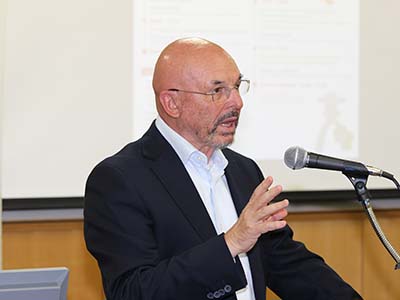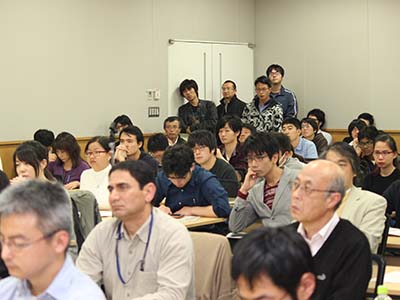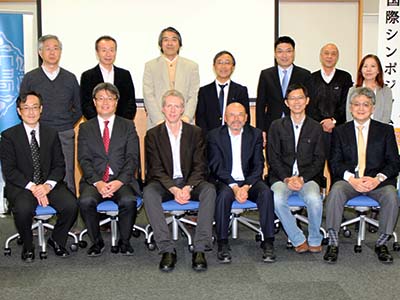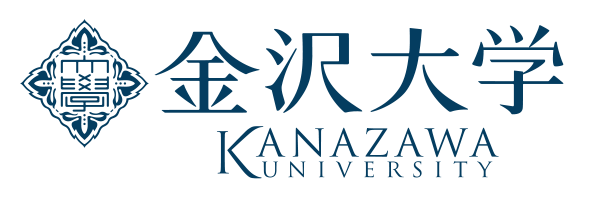11月15日,自然科学系図書館AVホールにて「金沢大学がん進展制御研究所国際シンポジウム2016」を開催し,学内外から約180名が参加しました。
本学がん進展制御研究所の大島正伸所長の開会のあいさつの後,フランス国立科学研究センター名誉教授のジャン・ポール・ティエリー博士の「がんの進展における上皮間葉転換:治療応用への試み」と題した特別講演からシンポジウムがスタート。
続く第1,第2セッションでは,本学の衣斐寛倫准教授(がん進展制御研究所/新学術創成研究機構),ウェイ・レオン・タム准教授(シンガポール国立大学がん科学研究所),本学の鈴木健之教授(がん進展制御研究所/新学術創成研究機構),ブレンダン・ジェンキンス教授(オーストラリア・ハドソン医学研究所)がそれぞれ発表を行いました。
セッション終了後,本シンポジウムのコーディネーターであるブーン・ドミニク准教授(金沢大学がん進展制御研究所/新学術創成研究機構)が今回の講演内容を振り返り閉会の挨拶としました。
シンポジウムでは,質問時間に真剣にノートをとり活発な討論をする研究者や学生達の姿が見られ,また, 活発な討論は休憩時間にもおよぶなど,世界で著名な研究者と交流ができ,がん研究の最新の動向についてディスカッションできる貴重な場となりました。
- 詳しくはこちら[PDF:4.9MB]
On 15th of November 2016, “The Kanazawa University Cancer Research Institute (KU CRI) International Symposium 2016” was held at Kanazawa University Natural Science and Technology Library AV Hall.
After the opening remarks by KUCRI Director Oshima, Symposium started from the Keynote lecture by Emeritus Professor Jean Paul Thiery (CNRS lnstitut Gustave Roussy, France; National University of Singapore). A world leader in the field of epithelial-mesenchymal transition, especially in the area of EMT-driven cancer progression and chemoresistance, Dr. Thiery spoke on the topic of EMT in the progression of carcinoma: therapeutic Intervention. Dr. Thiery’s Keynote address was followed by two sessions of scientific presentations.
In the first Session, A/Prof. Hiromichi Ebi from the CRI & lnFiniti of Kanazawa University spoke on EMT and feedback activation of RTK signaling induced by MEK inhibition in KRAS mutant lung cancer. And he was followed by A/Prof Wai Leong Tam of the Genome Institute of Singapore and Cancer Science Institute of Singapore) who further expounded on the topic of Therapeutic vulnerabilities in cancer stem cells.
In Session 2, Prof Takeshi Suzuki (CRI & lnFiniti, Kanazawa University) and Prof Brendon Jenkins (Hudson Institute of Medical Research & Monash University, Australia) presented their latest work. Dr. Suzuki lectured on how he utilized Retroviral insertional mutagenesis to identify histone methyl-modifying enzymes involved in malignant progression of cancer, while Dr. Jenkins presented his work on the role of pattern recognition receptors and inflammasomes in gastric cancer.
At the completion of the scientific presentations, the symposium coordinator A/Prof Dominic Voon, (CRI & lnFiniti, Kanazawa University) in his closing remarks.
Participation in this Symposium awards medical students in Doctoral Course credits to contribute to the development of young researcher. This time approximately 110 students participated as part of the 180 total attendances for this successful symposium.
This symposium saw strong participation from the attendance as reflected in the studious note taking by students and researchers alike; as well as vigorous discussion in question times. These were followed by active engagement in discussion during the break time, giving our researchers a valuable opportunity interact with renown international researchers and discuss the latest trends in cancer research.
-
 ジャン・ポール・ティエリー博士
ジャン・ポール・ティエリー博士
Prefessor Jean Paul Thiry -

-





 PAGE TOP
PAGE TOP